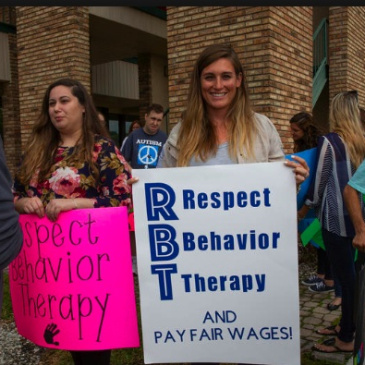Florida’s Fight for Medicaid Coverage for Applied Behavior Analysis Therapy
April 23, 2019

“There are no words to adequately express my disgust for the proposed budget cuts to ABA therapy by the Agency for Health Care Administration (AHCA) for the disabled who have Medicaid,” said Carmelita Smith, a mother with a child on the autism spectrum. Despite the tornado warnings in Northeast Florida Friday morning, she, along with other parents and ABA service providers rallied in Jacksonville advocating on behalf of some of the most vulnerable children in our state.”
Florida Medicaid System
Through the Florida Medicaid system, about 41,000 children statewide receive Applied Behavior Analysis (ABA) therapy. Children with maladaptive behaviors such as screaming, biting, and head-banging benefit from ABA, which helps them to control their harmful behaviors and learn to communicate better. While recipients don’t need a specific diagnosis to qualify for ABA, 90 percent of these children are diagnosed with Autism Spectrum Disorder.
“We need our voices heard,” said Asa Maass, the father of a 13-year-old daughter living with Autism. Asa and his family have been implementing ABA therapies with their daughter Abby for five years, but he’s concerned about the barriers AHCA is proposing for families like his on Medicaid. While addressing the lawmakers about the threatened Medicaid reimbursement cuts, he passionately emphasized that he and his family had tried a number of other services and therapies in the past, but he stressed, “the gains [his daughter] showed from ABA had far out weighed the other services.” Frustrated by the proposed changes, he said, “No knock on occupational therapy or speech therapy. Those are great. But when it comes to ABA, it is the most effective therapy for children with autism. It’s proven.”
Last month, AHCA announced it was considering a 51% rate cut for registered behavior technicians (RBT’s). Under the supervision of a board certified behavior analyst, RBT’s are the largest group of people who provide behavior analysis therapy to children on the autism spectrum. Families feared the cuts would result in clinics no longer affording to serve clients with Medicaid; and on the website for the Florida Association for Behavior Analysis (FABA), they said the cuts had “the potential to dramatically limit quality providers’ ability to render service.”
That’s why parents of children with special needs and ABA service providers are pushing back. ABA Solutions located in the Tampa Bay area advocated for their clients by attending the Tampa AHCA meeting earlier in the month. RBT’s, analysts, and senior staff from ABA Solutions stood alongside clients and parents rallying with other area providers. In addition, they’ve made a point to send representation to AHCA meetings in Orlando and Jacksonville in order to stand in solidarity with the other communities negatively impacted by these policies. They believe stakeholders across the state can foster real change by working together; and it appears AHCA is listening to the community’s outcry. As a result of state-wide rallies, AHCA’s proposed rate cuts have been postponed. Nevertheless, it is a small victory because other proposed changes are still on the table.
The state is cracking down on fraudulent billing practices by clinics, a much-needed measure to protect Medicaid funds allocated for treating individuals with disabilities. As fraud investigations are underway, a moratorium on new providers in Broward and Miami Dade Counties is in effect until May. The state is making provider credentialing more difficult, and in some cases, AHCA is retracting the credentials for registered RBT’s. But parents like Asa insist, “a scorched earth method is not effective,” and critics are concerned that the state is going too far. Children in dire need of services are desperately sitting on wait lists as agencies grapple with getting RBT’s credentialed. Some providers are giving up on Medicaid altogether and only serving children with private insurance.
Parents of children with disabilities are under an enormous amount of stress. “As a parent with a child with autism, I don’t know how my child feels. I can’t have a conversation with him, and he can’t tell me about his day,” says Carmelita Smith. “ Before ABA therapy we were prisoners in our own home. We couldn’t go to church, stores, not anywhere as a family. Self-injurious behaviors caused my son to be a danger to himself.” Because of ABA, her son can now communicate in basic sign language, and he is learning strategies to express his needs in appropriate ways. “ABA has completely changed our lives,” she told AHCA. “Our son has made progress, but he has a long way to go.” Carmelita believes autism has robbed her son of so much, and it’s her fear that the proposed changes and cuts to ABA will in addition rob him of services he drastically needs. “My fear is that no one will accept Medicaid for ABA therapy and my son will regress and lose the ability to reach his full potential.”
Parents, FABA, and behavior analyst agencies are urging law makers with this message: there is a need for the stakeholders to work together to clean up the fraudulent billing practices while still protecting the ABA services for children with disabilities. They would like to see providers and parents work in a coordinated effort with the state to rewrite policies that would protect services, lift the barriers on provider enrollment, and expedite RBT credentialing.
In Jacksonville, Friday’s thunderstorm erupted soon after a room full of parents and ABA service providers left their meeting with AHCA. Many wiped away tears, some wept openly. Others felt optimistic.
AHCA’s secretary Mary Mayhew said, “After hearing and carefully considering a large amount of public feedback, we have decided to modify our implementation schedule to address the concerns over the changes in behavior analysis services. The agency is fully committed to getting this right, and we look forward to continue working with families and providers toward our ultimate goal of ensuring children receive the right service, at the right time, by an appropriately credentialed and qualified provider.”
To date, 535 individuals have attended meetings in Florida and 130 have been waitlisted to express their concerns and hold the agency accountable. In an effort to accommodate up to 1,000 participants, the public meetings scheduled for the remainder of April and May will be webinars.
Getting Involved
Positive change will only happen if parents get involved, so a collaborative effort by parents, behavior analysis agencies and FABA to inform Florida’s policy makers is underway, and we encourage more to get involved. By stakeholders working together, we can tremendously inspire positive action and ensure ABA services for those who need it. Parents are being urged to document every phone call and email to the Agency for Health Care Administration, and then take their concerns to their lawmakers and elected representatives.
Links:
To contact your state representative:
https://www.house.gov/representatives/find-your-representative
To contact your Florida Senator:
https://www.flsenate.gov/Senators/Find
To learn more about ABA therapy:
https://abasolutions.com/
Find a Therapist near you:
https://abasolutions.com/locations/
Sources:
https://news.wjct.org/post/ahca-modifies-aba-therapy-meeting-format-program-implementation
https://wusfnews.wusf.usf.edu/post/ahca-postpones-behavior-analysis-therapy-cuts-proposes-other-changes
http://www.fdhc.state.fl.us/Executive/Communications/Press_Releases/pdf/04_19_19_FINAL_PressRelease_BAServices.pdf

